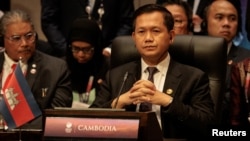Cambodia's first leadership change in almost four decades has given the United States an opportunity to reset its relationship with Phnom Penh, analysts and experts told VOA Khmer following a recent visit from an American diplomat.
However, Cambodia's slide away from democracy — along with claims that China is establishing an exclusive military presence at Cambodia's main naval base — continues to pose a major impediment to warming relations, they said in recent interviews.
Sebastian Strangio, the author of Hun Sen's Cambodia, said some voices in U.S. foreign policy circles were questioning the effectiveness of Washington's prevailing Cambodia policy even before former Prime Minister Hun Sen handed control to his son, Prime Minister Hun Manet, in August — ending the father's 38-year reign.
"There has been discussion amongst people who pay attention to Southeast Asia that the very moralistic tone of American policy toward Cambodia, really since the early '90s, has failed to achieve its goals, while also opening up the space for China to step in as Hun Sen's benefactor and patron, and that some sort of change in emphasis was needed," he said during an interview with VOA Khmer on March 28.
Strangio described tension between leading Hun Sen critics in Congress, who want human rights and democracy at the forefront of Cambodia policy, and more pragmatic figures in the State Department who are willing to sacrifice principles for more influence in Phnom Penh.
The coming to power of Manet, a graduate of the U.S. Military Academy at West Point, "has given an opportunity for the country to take a new approach, or for people advocating a new approach to get more of a hearing," Strangio said.
That shift was on full display after July's election. The U.S. initially froze $18 million in foreign aid to Cambodia in protest of the election, pointing to a "pattern of threats and harassment" against opposition politicians, journalists and civil society ahead of the vote.
Two months later, after Hun Manet was sworn in, Victoria Nuland, the acting U.S. deputy secretary of state, met with the new prime minister in New York and informed him the U.S. would unfreeze the funds.
Analysts say Assistant Secretary of State Daniel Kritenbrink's visit to Phnom Penh in late February showed the delicate balance the United States is pursuing, highlighting areas of agreement without entirely abandoning its stated priorities since helping broker peace in Cambodia 30 years ago.
The U.S. envoy, in an online news conference March 7, said he raised "areas of difference related to issues such as human rights, trafficking in persons, and creating space for free and independent media," while also reiterating the U.S. commitment to "a more prosperous, democratic, and independent country."
Kritenbrink praised Cambodia at the United Nations for cooperating with sanctions against North Korea and consistently condemning Russia's war in Ukraine.
Astrid Norén-Nilsson, a senior lecturer at the Center for East and South-East Asian Studies at Sweden's Lund University, said the U.S. "commitment to Cambodia remains fundamentally geopolitical."
She noted Hun Manet's government was sending some positive signals on the domestic front, despite the political repression.
"The new government's focus on administrative reform, its discourse of meritocracy, and its technocratic approach to policy also allow Western governments to latch on to its policy agendas," she said.
Kritenbrink said he and Hun Manet discussed the Ream Naval base, a pain point between the countries that has prompted U.S. sanctions against top military figures.
The U.S. accuses Cambodia of allowing China to develop the base as an exclusive Chinese naval outpost. Cambodia denies any such deal and says China will not have any special access to the base.
Paul Chambers, of the Center of ASEAN Community Studies at Naresuan University in Thailand, said Kritenbrink's visit was "meant to send a message to Cambodia that leading U.S. officials are worried about Cambodia's tilt to China.''
Chambers said the high level of Chinese military and economic involvement in Cambodia would remain a roadblock to expanding cooperation with Washington.
"It will deeply worsen U.S.-Cambodia relations unless there is an offset — Cambodia allows equal levels of U.S. security activity with Cambodia," he said in an email to VOA Khmer on March 13. Cambodia canceled its annual joint military drills with the United States in 2017.
Sophal Ear, an associate professor at the Thunderbird School of Global Management at Arizona State University and a longtime Cambodia observer, was optimistic about a potential breakthrough in U.S.-Cambodia relations.
"Timing is everything. Rapprochement may be on the menu," he said in an email last month.
"Cambodia is strategically located in Southeast Asia and is crucial to regional dynamics," he added. "Engaging with Cambodia allows the U.S. to promote its governance, trade, and regional security interests."
However, other analysts said the United States is likely unwilling to take steps that would significantly change the state of relations.
Christopher Primiano, an assistant professor of political science at Huntingdon College in Alabama who studies China's role in Southeast Asia, said Washington is not interested in competing with China in military or economic support for Hun Manet's government.
And though the tone from U.S. diplomats may have shifted to some extent, he told VOA in a phone call last week that criticism around democracy and human rights hasn't stopped.
"This will always be a source of discontent for the leadership in Cambodia," he said. "If the U.S. government were very interested in Cambodia as a security partner, then we think that we would see less naming and shaming."
Sim Chansamnang contributed to this report.






